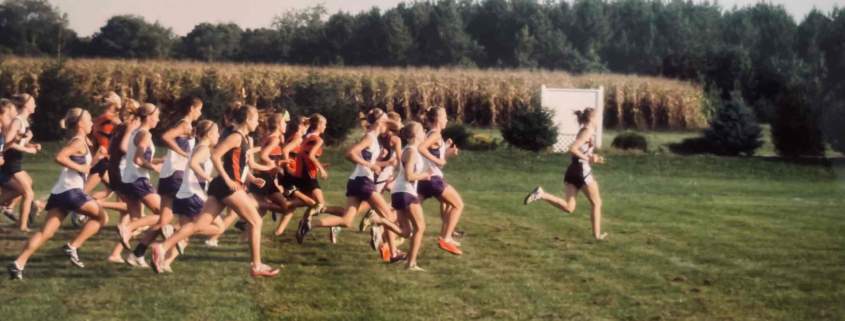5 Things Coaches Should Avoid Saying to Adolescent Athletes
By: Amanda Feldman
Amanda Feldman is a graduate student in Boston University’s Nutrition and Dietetics program pursuing her RDN credential with a special interest in sports nutrition and eating disorders. Outside of the classroom, she is a high school Varsity Softball and Cross Country coach at the Dana Hall School in Wellesley, MA, where she graduated before continuing on to play 2 years of collegiate softball at Trinity College in Hartford, CT. In her free time, Amanda is an avid long-distance runner and is passionate about sharing her love for running, athletics, and nutrition education.
Eating disorders are serious mental illnesses that come in all shapes and sizes.1 Male-identifying and female-identifying. Those in larger and smaller bodies. They can occur in runners, football players, soccer players, dancers, fencers and everything in between.
As a former athlete and a current high school coach myself, I am aware of the unique role coaches play in an adolescent athlete’s life. We act as role models, mentors, and individuals our athletes are trying to impress. In some cases, the internal pressure to impress a coach is so high our athletes will do anything and everything asked of them to get on the field, be a starter, become a captain, or earn a coach’s respect. Because of this, everything from the way coaches talk about goal setting, fueling and food, athletes’ bodies, and body changes can have a profound impact on an athlete – be that positive or negative.
Some individuals have a predisposition that puts them at a higher risk for developing an eating disorder. Eating disorders are “complex traits,” and multiple environmental and genetic factors play a role in their development.1 This includes individual’s genetics, past experiences, societal pressures, traumas, and other mental health diagnoses to name a few factors. It is hard for us to identify exactly who is at high risk for developing one, but what we do know is that adolescence is a vulnerable period,2 one in which eating disorders too commonly manifest. This is why we need to place high importance on eating disorder prevention.
One way that coaches can play a role in eating disorder prevention is by being extremely cognizant about what we say to our athletes. As a coach myself who also has had education in nutrition and eating disorder prevention and treatment, I have created a list of things coaches should avoid saying to their adolescent athletes in order to minimize the detrimental effects our words can have.
1. “Don’t eat or drink that during the season”
Sometimes us coaches believe we know what is best for our athletes in every aspect of life. Whether we were a successful athlete ourselves, read something on the internet, or we are comparing our athletes to what pro-athletes are doing, we think we are offering helpful advice. When it comes to food, however, I strongly believe COACHES SHOULD NOT BE GIVING NUTRITION ADVICE IF THEY ARE NOT REGISTERED DIETITIANS.
As a coach, I’ve witnessed other coaches give innocent advice to their athletes regarding food. For example, saying to a track athlete “you don’t need to carbo-load before your race because it’s a short distance… focus on eating lean protein and fruits and vegetables.” Firstly, this is poor advice to give an athlete, as the high fiber content in fruits and vegetables can cause GI distress in many athletes during exercise.3 While yes, maybe a 300-meter track runner may not benefit from “carbo-loading” like a marathon runner would, it does not mean athletes should not consume carbohydrates before a race or game. Actually, the complete opposite–carbs are our bodies main source of fuel.3
Secondly, assigning morality to food is one thing that can lead to disordered eating, especially if we hear it from a coach. The all-too-common notion that “carbs are bad” feeds into the all-or-nothing approach to eating. This is a great blog post that was shared with me in my Sports Nutrition course: Can We Stop Assigning Moral Value to Food?.4 My advice is for coaches to seek nutrition help and advice for their team from a Registered Dietitian.
2. “You are looking extra lean these days. Keep up the good work.”
Comments like these are all too common. It is almost always meant with the best of intentions, but the repercussions can be detrimental to an athlete. We do not know if an athlete is struggling with body image, losing weight unintentionally, or if they have an eating disorder. If an athlete is struggling with body image or disordered eating, which we may not always see as coaches, praise like this can feed into eating disorder behaviors.2 It tells an athlete that their disordered eating behaviors are good and benefiting them and us as coaches are noticing. Because we truly do not know what is going on in someone’s life or head, we as coaches need to focus on giving praise for factors that truly matter, like performance, hard work and attitude – not shape or size of bodies.
3. “I think losing a few pounds would improve your performance.”
As a society, we praise losing weight and we often think it is the solution to all problems. Many adolescents are still growing at this stage of life and the most important thing is that they are properly growing along their growth curve.5 Weight loss should not be a focus.
Telling an athlete they should lose weight is completely inappropriate. We as coaches are not medical professionals or dietitians. And frankly, weight should not be a factor. The truth is weight is just a number, and individuals in different bodies can excel at different sports. It is important that we focus on our athletes properly nourishing themselves and growing, rather than on weight. There are also many medical complications that can occur from undernourishment and energy deficiency. This is referred to as Relative Energy Deficiency in Sport (RED-S) and can include menstrual dysfunction and low bone mineral density, both serious complications in growing bodies.2 Lastly, comments like this are feeding into societies weight-focused attitude, that we really should work to change.
4. “If you want to play in college, training has to be your number 1 priority.”
This one is tough. It is meant to bring out the motivation and drive in an athlete. As a former college athlete myself, I remember in high school believing that if I wanted to get recruited to play in college I had to dedicate all of my time to my sport. A lot of our athletes who want to play sports in college already see training as their number 1 priority. I am in no way saying that athletes should not work hard if they want to play in college and should not work towards this goal. It’s the reinforcement that training should be placed at the highest of priorities that gets some into trouble.
Adolescents have other inherent priorities that they need to focus on like doing well in school. Adolescence is also a time that should be spent with friends and trying new things. Maybe it’s even a time to make mistakes. The mentality that training is the only priority trickles into other aspects of life. It changes eating patterns, workout schedules, and places less of a focus on things that are also important like school, health, sleep, family, and friends. It also can lead to burnout.
I think a much better narrative leading to longevity as an athlete sounds like this: “If you want to play in college, it is important to have balance in your life. That means focusing on your schoolwork and mental health, nourishing your body, and finding ways to work towards your goals to put yourself in the best possible position to continue to play at the next level.”
5. “Suck it up!”
The truth is, we have no idea what is going on in someone’s life. As my professor and a top mind in this field, Paula Quatromoni, said in the The Nomadic Podcast, episode 217, the “suck it up” phrase is invalidating to any individual.6 It gives the impression that what someone is going through is not important.
Adolescence is a vulnerable period. Bodies are changing, hormones are raging, and unfortunately many do struggle with mental health. It is important to move away from phrases like these and focus on positive motivation. If an athlete is upset about something, even if it seems silly, there may be a deeper underlying meaning to it. Thus, we need to validate our athletes and show that them that it is ok to have feelings and let them show.
If you believe an athlete may be struggling with an eating disorder, know that it is not a coach’s job to treat an athlete by prying or acting as a therapist. It is our job to show our athletes our unconditional support and to connect them to a professional that can help. This would likely include an Athletic Trainer or Counselor at your school. These trained professionals can take it from there by talking with the athlete, conducting screening, and communicating concerns with parents.
As a team of concerned adults, you can identify other professionals in the community to build a referral network of nutrition and mental health professionals for families seeking help. These experts may be in a position to bring education on eating disorder prevention to your school community. If we are worried about one of our athletes or the athlete trusts us enough to share that they are struggling, it is our job to show them compassion and get them help as soon as possible.
References:
- Schaumberg K, Welch E, Breithaupt L, Hubel C, Baker J, Munn-Chernoff-M el al. The Science Behind the Academy for Eating Disorders’ Nine Truths About Eating Disorders. Eur Eat Disord Rev. 2017;25(6):432-450. Doi:10.1002/erv.2553.
- Gaudiani JL. Sick Enough. Routledge; 2019.
- The Academy of Nutrition and Dietetics, American College of Sports Medicine, Dieticians of Canada. Position of the Academy of Nutrition and Dietetics of Canada, and the American College of Sports Medicine: Nutrition and Athletic Performance. J Acad Nut Diet. 2016;116(3):501-528. Doi:10.1016/j.jand2015.12.006.
- Wilson J. Can we stop assigning moral value to food? Medium. 2019. https://medium.com/@jenwilson4472/can-we-stop-assigning-moral-value-to-food-55ff4983fd91
- National Center for Health Statistics. Clinical Growth Charts. Centers of Disease Control and Prevention. June 16, 2017. Accessed February 19, 2022. https://www.cdc.gov/growthcharts/clinical_charts.htm
- Thomas A. “Paula Quatromoni.” The Nomadic Podcast. January 24, 2022





